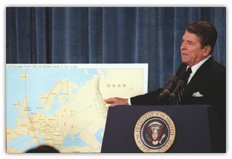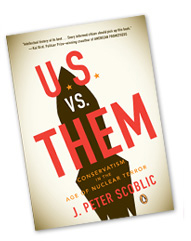For nearly eight years, the American people have struggled to understand George W. Bush’s approach to the world. Many analysts, lacking a frame of reference, have simply dubbed it revolutionary. But in U.S. vs. Them, J. Peter Scoblic provocatively argues that the best way to understand Bush’s foreign policy is to recognize that it is not radical, but rather the most recent expression of conservatism, an often misunderstood ideology whose national security instincts are rooted in America’s eighteenth-century view of itself and whose modern form has percolated for more than a half century, reaching full strength in the wake of the September 11, 2001, attacks.
 Scoblic persuasively shows that the foreign policy of the American Right has been stuck for decades on a binary setting that allows it to see the world only in terms of us versus them or good versus evil. During the Cold War, that approach fostered an unwillingness to negotiate with the Soviet Union, a distrust of apolitical intelligence, and an insistence on military dominance—even as the advent of nuclear weapons rendered the traditional notion of victory in war obsolete. Today, what conservatives often present as moral clarity is in fact nothing more than a continued failure to recognize that American security depends on our ability to think outside our borders—to stop seeing the United States in unavoidable opposition to the world.
Scoblic persuasively shows that the foreign policy of the American Right has been stuck for decades on a binary setting that allows it to see the world only in terms of us versus them or good versus evil. During the Cold War, that approach fostered an unwillingness to negotiate with the Soviet Union, a distrust of apolitical intelligence, and an insistence on military dominance—even as the advent of nuclear weapons rendered the traditional notion of victory in war obsolete. Today, what conservatives often present as moral clarity is in fact nothing more than a continued failure to recognize that American security depends on our ability to think outside our borders—to stop seeing the United States in unavoidable opposition to the world.
Tracing the history of Cold War conservatism from its development by William F. Buckley to its manifestation in Barry Goldwater through its implementation by Ronald Reagan and its culmination in the Bush administration, Scoblic weaves an intellectual history that reveals how the Right’s belligerence, intransigence, and disinclination for diplomacy brought us to the brink of nuclear war with the Soviet Union. More recently it has failed to meet the grave post-9/11 challenges posed by Iraq, Iran, North Korea, and especially by the most serious danger that looms before us: that of nuclear terrorism. What’s more, although the Bush administration is nearing its end, conservatism is certainly not, as the 2008 Republican presidential candidates clearly demonstrated.
U.S. vs. Them is a revealing and sometimes alarming analysis, but in diagnosing the origins of Bush’s foreign policy, it illuminates the path to renewed American leadership in the twenty-first century.
